SMALL-TOWN SOUTH AFRICA
Dullstroom: Tourist haven battles to survive in lockdown-crushed economy
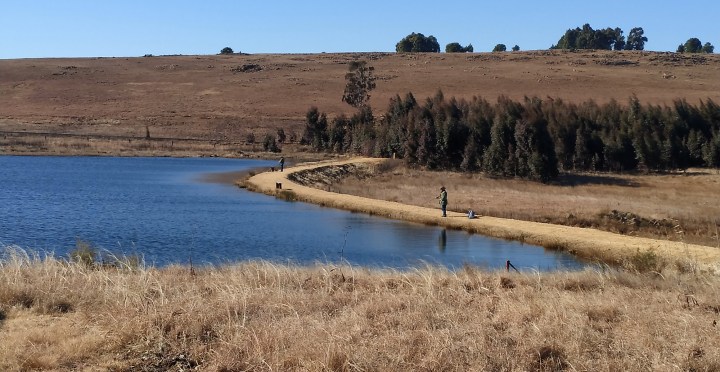
Covid-19, lockdown and an interprovincial travel ban could sound the death knell for small towns dotted across South Africa that rely on local tourism to keep the cash register busy.
Outside the Village Angler shop in Dullstroom, the fishing report board lies bare.
Usually, scribbled on the whiteboard would be names like Black Woolly Bugger, Dingemalery and DDD – a suggestion of flies for the day to entice a trout out of the many dams that dot the rolling grasslands that surround the tourist town.
Instead, tacked on the board is a typed note telling customers they will have to wear a mask and maintain physical distance if they want to enter the store. The out-of-town fly fishermen who religiously eyed that board for an inkling of what fly to use to catch Dullstroom’s best-known export haven’t been around for a while now.

Emma J Moseby is a so-called Covid refugee, who fled Cape Town to the small town of Tonteldoos to escape the spreading virus. (Photo: Shaun Smillie)
The Covid-19 lockdown, and with it the interprovincial travel ban, is throttling the economy of the town. Not so long ago coaches coming from the Kruger National Park would park in the heart of the town to allow tourists to eat at the many restaurants or head into the shops and buy curios.
On Fridays, the 4x4s with GP licence plates would arrive – the Gautengers, whom shop owners believe made up at least 70% of the revenue that kept the town afloat.
Now, most of the traffic on the R540 that also serves as Dullstroom’s High Street doesn’t stop, it passes through, heading to Lydenburg and beyond.
“If we don’t open soon we will become a ghost town,” sighs Gerrit Claassen, the owner of Trams Antiques.
“And when they [Gautengers] do come back, will they have expendable capital?”
The Gautengers didn’t just come for the fishing; over the years the town branched out to offer other activities. There are mountain bike trails, horse riding and the town has become a favoured destination for bachelor parties.

Every Thursday volunteers from Dullstroom and neighbouring Sakhelwa gather food parcels and deliver them door to door. The lockdown has resulted in a spike of unemployment in the area. (Photo supplied)
On a Saturday afternoon the pub crawl usually started at the Anvil Ale brewery, on the north-east edge of town, says Daphne Auer, and it ended in the wee hours at Auer’s pub, The Poacher.
Usually, this is the busy time for establishments like The Poacher. The first half of the year is crammed with public holidays and events that draw tourists in for the weekend: St Patrick’s Day, Easter, the Lekkerland carnival and the Dullstroom Winter Festival, also known as Christmas in July.
“This is when you make a bit of money and you put it away for a bad month,” says Auer’s partner Douggie Smith.
Under Level 3 of the lockdown, The Poacher can sell takeaways, but business is still bad. The other day all Smith sold was a Play energy drink. Up till now, the town’s remoteness protected it from the Coronavirus.
The Emakhazeni municipality, in which Dullstroom lies, had by Monday 1 July registered only seven Covid-19 cases, of which four patients had recovered. But the virus has killed three restaurants and left hundreds of residents relying on feeding schemes to get by.
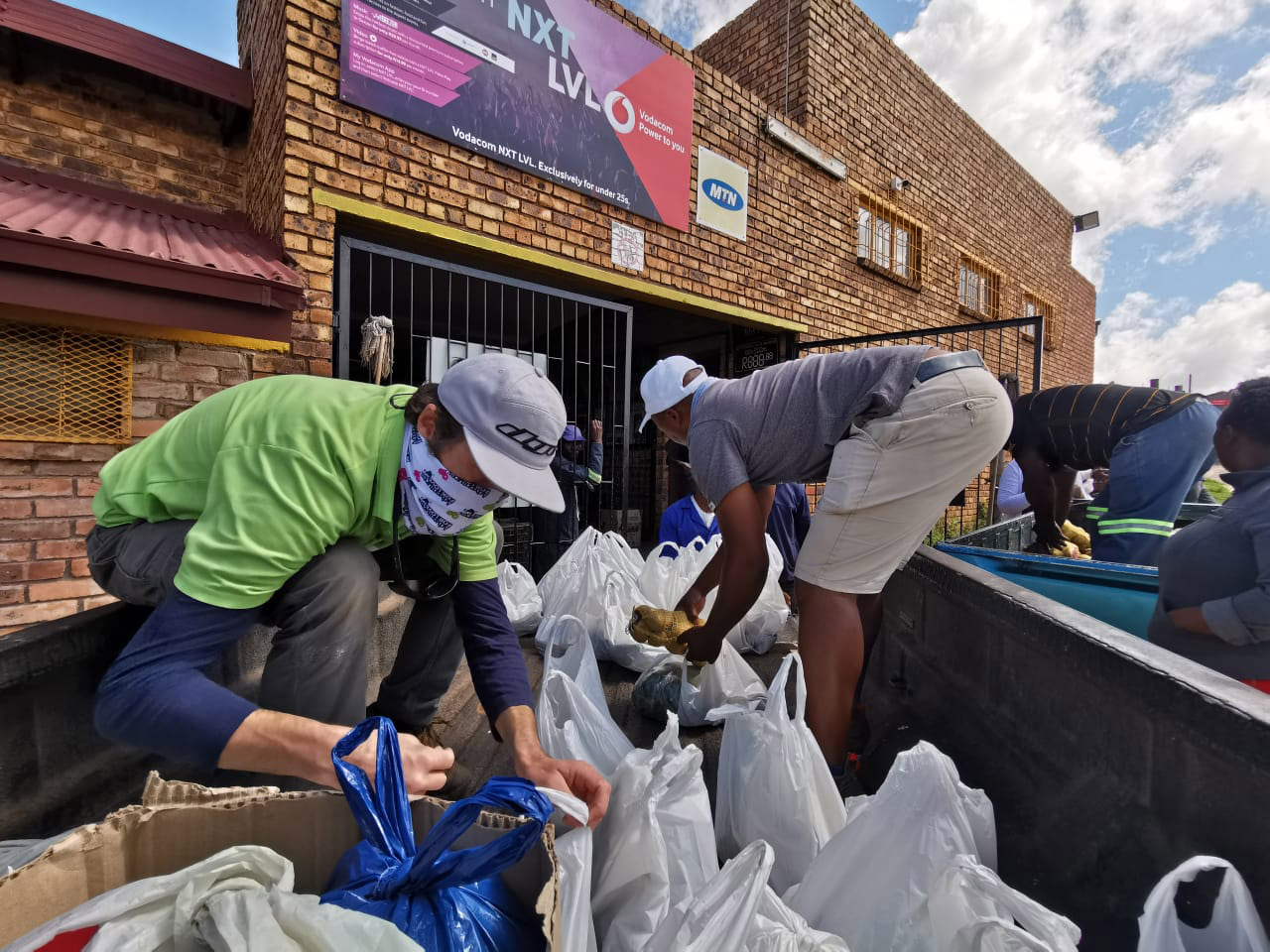
Every Thursday volunteers from Dullstroom and neighbouring Sakhelwa gather food parcels and deliver them door to door. The lockdown has resulted in a spike of unemployment in the area. (Photo: Supplied)
“It was frightening, I didn’t realise there was such need,” says Joyce Opperman, who owns The Coachman restaurant.
Shortly after South Africa went into hard lockdown, Opperman and several other restaurant owners began providing a meal a day for 39 people who lived in the town.
“There were seven children and we would spoil them by making cookies,” recalls Opperman.
As the lockdown moved from Level 5 to Level 4 and then Level 3, many of the recipients of the meals were able to return to work, and out of the 39 people, the number has now dwindled to one.
Other feeding schemes also sprang up to help. School pupil Khadeeja Vaid started one when her mother told her she had to find something to do, now that her school was closed during lockdown. With the help of relatives from Middleburg, she began distributing food parcels in Dullstroom and to farms nearby. She found families in desperate need.
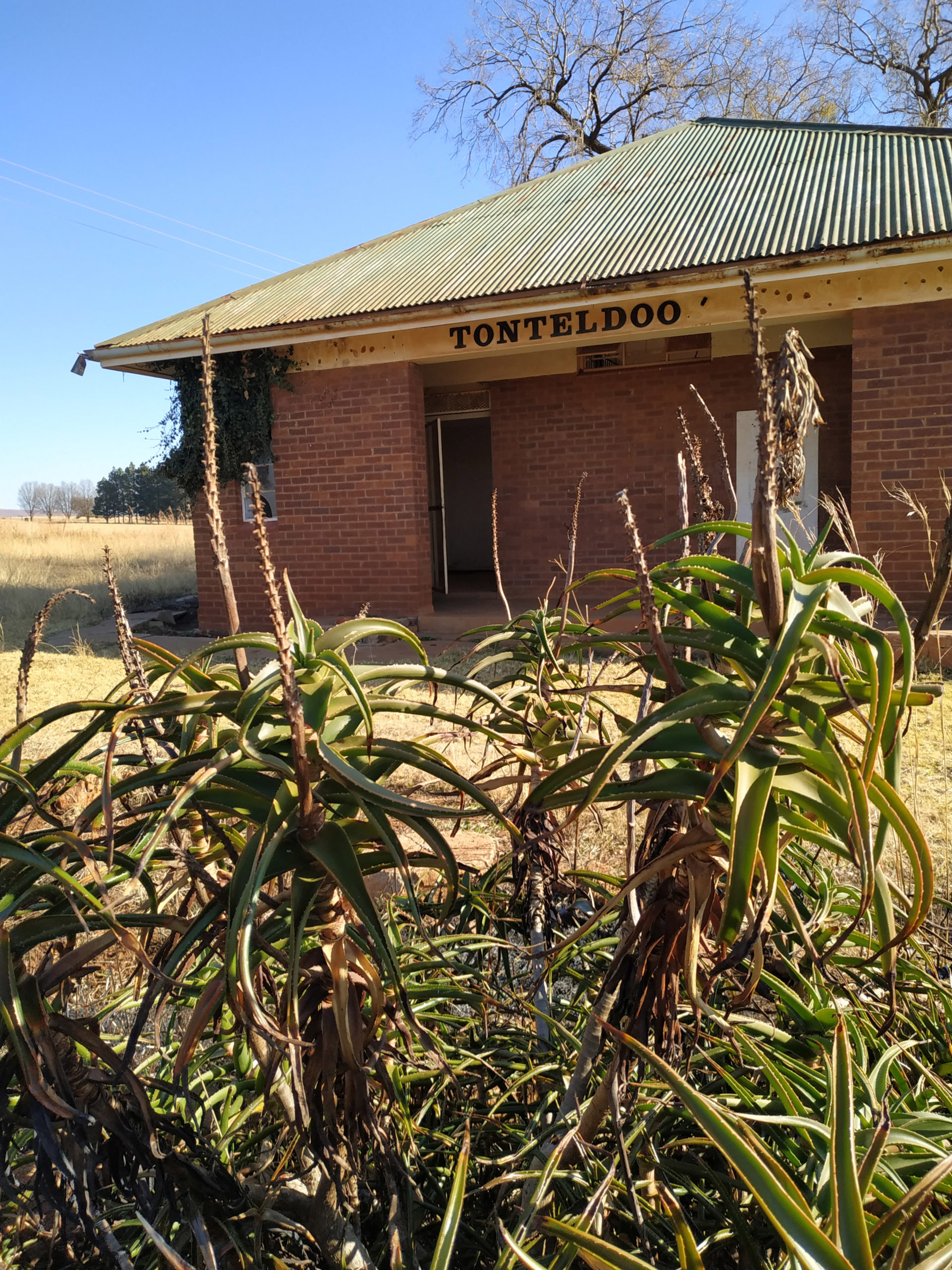
The abandoned post office inTonteldoos. (Photo: Shaun Smillie)
“One woman on a farm had no child grant, and they were only able to eat one meal a day. She had tears in her eyes when we handed her the parcel,” says Vaid.
In the adjacent township of Sakhelwe the closure of restaurants and shops during lockdown has caused a spike in unemployment.
“The locals are struggling here,” says Simphiwe Skhosana, the coordinator at the Dullstroom Learning Centre in Sakhelwe. “But at least the locals have families to help them, it is the foreigners who have nothing.”
The centre used to feed 100 children, but now, with the assistance of an organisation called Helping Hands, it distributes food to 250 families.
Every Thursday bakkies go door-to-door delivering food parcels. Of the 250 families, 50 are foreigners. The money for the food parcels comes from sponsorships and donations.

Jaco van der Berg runs the trading store and tavern in Tonteldoos (Photo: Shaun Smillie)
About 21km from Dullstroom on a rough dirt road that cuts close to the Steenkampsberg mountain range is a blip of a town called Tonteldoos. The standing joke is that no one is sure if Tonteldoos is in Mpumalanga or in Limpopo.
“They say even the government doesn’t know where Tonteldoos is,” laughs Jaco van der Berg, the owner of the local trading store and tavern.
Some residents sport “I’d rather be in Tonteldoos” bumper stickers on their bakkies, and scoff at Dullstroom with its big-town ways. Like Dullstroom, lockdown has hit Tonteldoos hard with some businesses forced to close.
As the end of the month drew closer one farmer in the area was forced to shoot an eland and ground the meat into mince. He was in a race to sell enough of the mince so he could top up his bank account in time for when the debt orders started coming through.
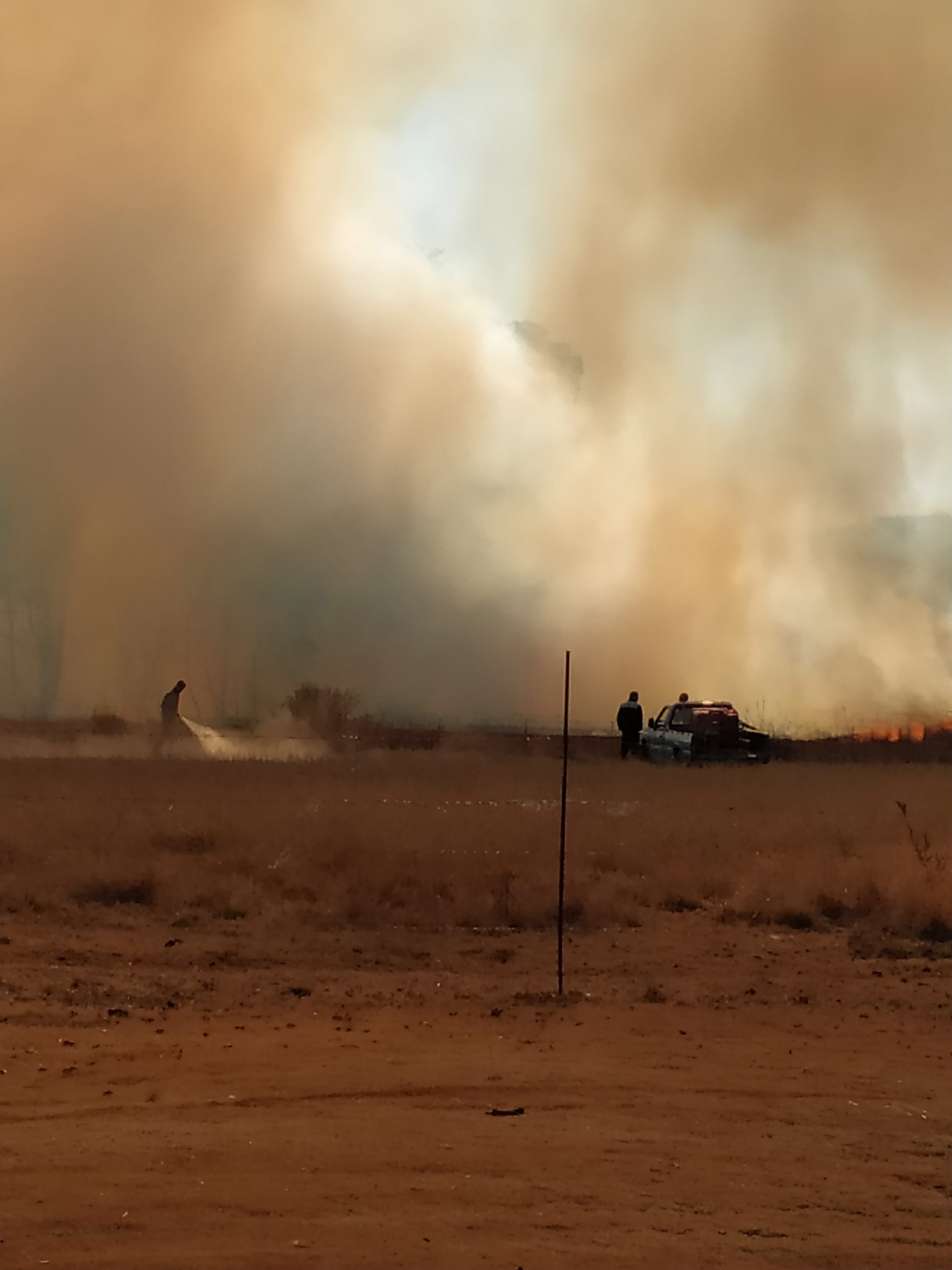
Besides the threat of Covid-19, farmers in the Dullstroom area are in the middle of veld fire season. (Photo: Shaun Smillie)
Tonteldoos is now home to a couple of Covid-19 refugees who have decided to wait out the pandemic far away from the crowded cities that are experiencing spikes in infection.
Van der Berg sold his entire stock of alcohol to a man who arrived on the eve of the lockdown in a big truck with enough supplies to last a couple of weeks. A little bit further down the road from Van der Berg’s store is The Cat and The Cow restaurant. Here another Covid-19 refugee, Emma J Moseby, has taken residence.
Just before lockdown, Moseby left Cape Town for Tonteldoos after an internet search led her to the restaurant and the farm, which happened to be looking for live-in help.
“I am a bit of a conspiracy theorist and when I saw the virus hit the third country, I said to myself ‘Oh my gosh, I have to do something before everything is shut down’.”
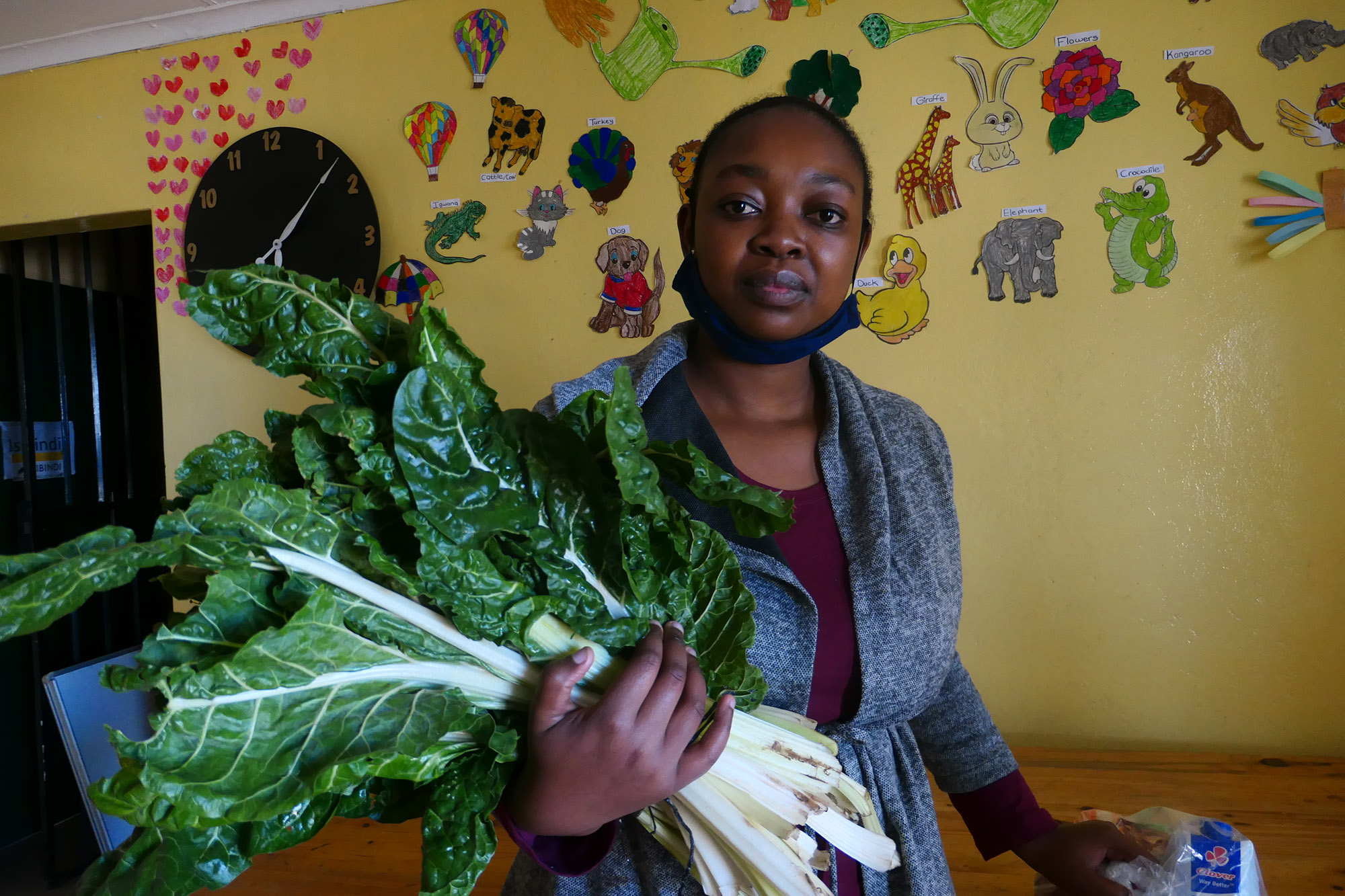
Simphiwe Skhosana, the co-ordinator at the Dullstroom Learning Centre, is involved in a feeding scheme in Sakhelwa. (Photo: Shaun Smillie)
Back in Dullstroom, life is getting a little bit better. Level 3 means that fishing is allowed and the restaurants can reopen. On the last Saturday of June, the town, said the locals, was busier than it had been for a long time. There were even a couple of Joburgers in town, who somehow had made it through the SAPS/SANDF roadblock on the N12 highway.
The easing has also given many of the locals time to count the cost of the lockdown that was closing in on 100 days.
One business did do surprisingly well during lockdown and it might just be an indication of what change the Covid-19 pandemic is going to bring to society and maybe Dullstroom. Trish Kennedy said that over the lockdown period her company, Zest Properties, sold six houses in the area.

Usually the main street of Dullstroom is full of visitors, but now the interprovincial travel ban is strangling the economy. (Photo: Shaun Smillie)
“It is very unusual, we would have expected to have done nothing and the enquiries have been strong too.”
While Kennedy is not sure what caused this unexpected boom, she does wonder if it might have something to do with people, having experienced lockdown, awakening to the idea that they don’t need to fight rush hour traffic to get to an office to run their businesses. And with Zoom chats and a decent internet connection they might as well run their company remotely from Dullstroom.
There are still likely to be dark days ahead and it is probably just a matter of time before the virus begins to seriously spread out across this corner of the Highveld. But one family has seen such dark times before, and knows the town has the ability to pull through.
Next door to the Dullstroom mosque, at the bottom end of town, is the Blue Shop. The store was built by the Vaid family 100 years ago, long before the trout boom and when Dullstroom only had eight shops.

The Vaid family (Khadeeja, Fatima and Mahmood) stand in front of the Blue Shop. The family, who settled in the town more than 100 years ago, has watched the residents of Dullstroom endure war, depression and now a pandemic. (Photo: Shaun Smillie)
During that time the Vaid family has watched the town deal with adversity. There has been a depression, war and the threat of forced removals during the height of apartheid. In 2006 a tornado ripped through town and took the roof off the Blue Shop. The town’s folk gathered and helped the Vaids rebuild the shop.
“Everyone was there for you and that is what makes Dullstroom unique,” says Mahmood Vaid. DM
"Information pertaining to Covid-19, vaccines, how to control the spread of the virus and potential treatments is ever-changing. Under the South African Disaster Management Act Regulation 11(5)(c) it is prohibited to publish information through any medium with the intention to deceive people on government measures to address COVID-19. We are therefore disabling the comment section on this article in order to protect both the commenting member and ourselves from potential liability. Should you have additional information that you think we should know, please email [email protected]"



















 Become an Insider
Become an Insider